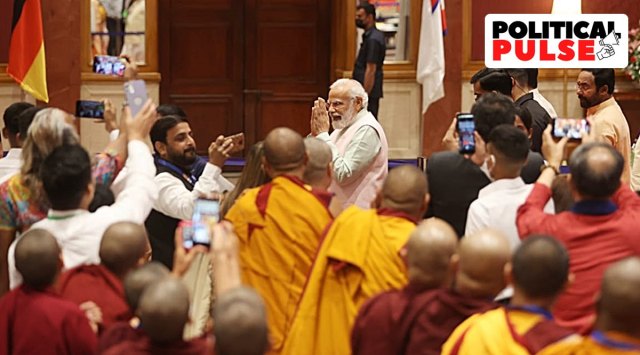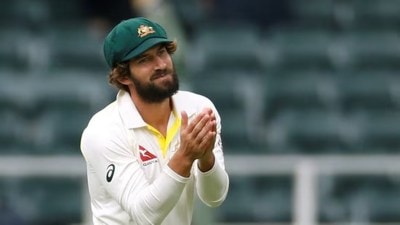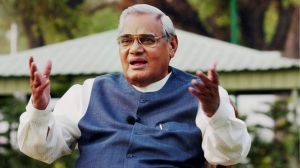With summit, Modi takes one more step towards enlarging Indian footprint in Buddhist world
The International Buddhist Confederation, organiser of Global Buddhism Summit along with Union govt, has been driving government's initiatives, even as presence of Dalai Lama keeps China away, leaves more space for India
 Prime Minister Narendra Modi at the inaugural session of the Global Buddhist Summit in New Delhi, organised by the Union Ministry of Cultural Affairs in collaboration with the International Buddhist Confederation (IBC). (Express Photo by Tashi Tobgyal)
Prime Minister Narendra Modi at the inaugural session of the Global Buddhist Summit in New Delhi, organised by the Union Ministry of Cultural Affairs in collaboration with the International Buddhist Confederation (IBC). (Express Photo by Tashi Tobgyal) From armed conflicts to ecological crises, there is no challenge faced by the modern world that cannot be solved if one draws from the centuries-old teachings of the Lord Buddha, Prime Minister Narendra Modi said on Thursday.
He was speaking at the inaugural session of the Global Buddhist Summit in New Delhi, organised by the Union Ministry of Cultural Affairs in collaboration with the International Buddhist Confederation (IBC).
The significance of the ongoing summit lies not just in the size of the gathering, but its geopolitical import, which can be traced back to the birth of the IBC in November 2011, when the Congress-led UPA was in power. New Delhi had then hosted the Global Buddhist Congregation, which was also skipped by China due to the presence of the Tibetan spiritual leader, the Dalai Lama. It was at that event that a resolution was adopted to form the IBC.
To register its protest against the Dalai Lama’s presence, which New Delhi had maintained was “religious, not political” in nature, China had even called off border talks scheduled around that time.
Officially, the IBC, which was formally registered in November 2012, has objectives such as “lending a united voice to all Buddhist organisations, towards addressing and engaging in issues of common global concern”. But principally, the idea is to revive India’s position as the centre of the Buddhist faith, by acting as a countervailing force to China, home to the world’s largest Buddhist population.
The Dalai Lama, who is a member of the IBC’s council of patrons, attended the summit on Friday. During a session, which was not open to the media, he spoke about “compassion, wisdom and meditation”, the PTI reported, quoting a source.
His presence is being considered as the primary reason behind Buddhist delegates from China skipping the summit, despite being invited. It can also be gauged from the fact that Chinese delegates did attend the international conference on shared Buddhist heritage, organised by the Shanghai Cooperation Organisation (SCO) in Delhi in March this year. The IBC, which received grants from the Centre, was also associated with the conference.
 Prime Minister Narendra Modi pays tribute to Gautam Buddha during the inauguration of Global Buddhist Summit. (Express photo by Tashi Tobgyal)
Prime Minister Narendra Modi pays tribute to Gautam Buddha during the inauguration of Global Buddhist Summit. (Express photo by Tashi Tobgyal)
To be sure, the organisers maintain that invites for the ongoing summit were sent out only to Buddhist forums, not government functionaries. Yet, the political undertones of the event and its attendance list cannot be wished away. Indeed, the IBC has acted as a major driver behind many initiatives taken by the Modi government, ever since it took office in 2014, to make India’s presence felt in the Buddhist world.
For instance, in 2015, the IBC, in partnership with the Vivekananda International Foundation, which is also considered close to the ruling establishment, organised a three-day global conclave, “Samvad: Hindu-Buddhist Initiative on Conflict Avoidance and Environment Consciousness”. It was inaugurated by Modi.
Two years later, the IBC held another conference on “Buddhism for Twenty First Century Perspectives and Responses to Global Issues” in Bihar, with then President Pranab Mukherjee among the dignitaries present in it.
In his speech on Thursday, Modi also listed initiatives to revitalise Buddhist traditions taken by his government outside those led by the IBC, including the development of the Indo-Nepal Buddhist Circuit, and the redevelopment of places like Sarnath and Kushinagar.
- 01
- 02
- 03
- 04
- 05































